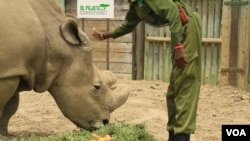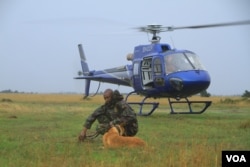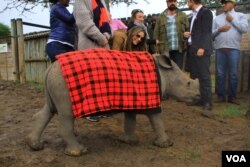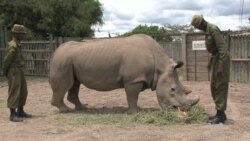At a lodge beneath the shadows of Mount Kenya, the presidents of Kenya, Botswana, Gabon and Uganda, as well as conservationists, business people, tourism operators and global philanthropists, met to discuss a problem devastating countries across Africa: the killing of tens of thousands of elephants every year to feed the illegal ivory trade.
The three-day Giants Club Summit aims to find solutions to protect elephants and safeguard their landscapes.
Ol Pejeta, the largest black rhino sanctuary in East Africa, and a place that has quite a bit of experience with anti-poaching strategies, hosted a day of demonstrations and talks to help summit participants better understand the fight against poaching.
Such high-level governmental support is crucial to stop the poaching epidemic, says Max Graham, the founder and CEO of Space for Giants, an elephant protection charity that provides technical advice to the Giants Club members and is supporting the summit.
"We haven't seen anything on the continent dealing directly with this issue, at this level of participation,” Graham said. “And that's why it's worthwhile. The political will, and I'll say this again, if you have political will at the very top, everything else becomes easy."
For governments in Africa, the tourism industry provides a strong incentive to protect the wildlife, according to Kenya's cabinet secretary for tourism, Najib Balala.
"So, yes, we care because it is important for our GDP," Balala said.
Wide-ranging lessons
Participants at the day's events watched a demonstration by Ol Pejeta's rapid response team, which showcased how Kenyan police reservists — along with a tracker dog — can land via helicopter at the scene of a crime and begin their work.
Participants also watched re-enactments of human conflict with elephants, learned about the importance of judicial reform when it comes to prosecuting poachers, and discovered the different types of fences and deterrents being used to stop elephants from crop raiding.
For Wayne Lotter, co-director of a conservation NGO in Tanzania called PAMS Foundation, the event provided "an opportunity to come and network with other people, share best practices and learn that there's some good people here, and we can also share some of our experiences."
The participants — as well as English actress and model Elizabeth Hurley — also had the opportunity to meet Sudan, the last remaining male northern white rhino in the world, and a 6-month-old white rhino calf named Ringo, who perhaps gives a glimmer of hope in this fight against poaching.
WATCH: Elephant Anti-Poaching Summit Convenes

















